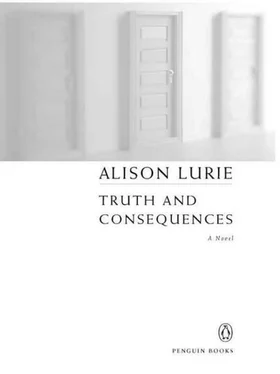She carried the flowers upstairs and knocked on Delia’s door, then called her name, but there was no answer—clearly, she’d gone home. She opened the door and saw an empty room with light streaming in and Alan’s drafting table covered with papers—of course, Alan had changed offices with Delia, she remembered with annoyance—and he, no doubt, was in the library.
The door of Delia’s new office across the hall was locked, and she did not answer a knock or call; but Jane had a master key.
Inside, the velvet curtains were drawn, the room full of heavy shadows. The first thing Jane could make out after she pushed the door open was that Delia was still there, lying on the big green sofa. She was in a state of disarray: her hair disheveled, her clothes rumpled. She’s having another migraine, Jane thought.
“Oh, I’m sorry, I—I thought you’d gone home,” she stammered. “I didn’t mean to disturb you, but these flowers came. I didn’t want them to die over the weekend, so I put them in water—”
“Yes. Thank you so much,” Delia said in a kind of exhausted whisper.
Jane looked around for a place to set the vase down, and saw something strange: the heavy dark-green velvet curtain to the right of the bay window was bulging out oddly, and a pair of large feet, in black socks, protruded from below it. A man was hiding there, she realized. Delia wasn’t ill, she was cheating on Henry with somebody. It could be one of the other Fellows, Davi Gakar or Charlie Amir, both of whom had crushes on her. Or it could be somebody else, some stranger who had sneaked into the Center while Jane was in the supply room. In any case it would be best if she did not actually see him or acknowledge that he was there.
“I’ll put these on the desk,” she said in a strained, artificial voice.
“That’s fine,” Delia whispered.
But as Jane crossed the room, averting her eyes from the bulging curtain and the feet, she saw a man’s jacket lying on the desk chair. It was a jacket that she had seen before: gray tweed with woven leather buttons and a light-gray silky lining like the one she herself had mended only a week ago, with a material that did not quite match. Yes. There was the patch, exactly like on Alan’s tweed jacket. Was that possible?
Without stopping to think, wanting only to understand, she turned and pulled back the velvet curtain. There stood her husband, with his shoes off and his denim shirt hanging out.
“Jane, listen, it’s not what you think,” he croaked.
Jane could not answer: her head was suddenly full of smoke and steam. She had not felt this sort of betrayal since junior high school—and it was the language of junior high school that now rose to her lips.
“You creep!” she cried. “You sneaky, disgusting little creep!” She might have gone on, but was distracted by a sound from across the room: the sound of laughter. She looked around, dizzy and furious, and saw Delia lying in an untidy crush of pale, lacy clothes, convulsed with mirth.
“Don’t you laugh at me, you nasty witch!” Jane shouted, enraged, and raised the big vase of flowers, which had now become a convenient weapon. But at the last moment a half-conscious sense of her responsibility as an administrator caused her to pull the flowers and ferns out of their antique cut-glass container (Property of the Unger Center for the Humanities) before she threw them hard at Delia.
Then, stifling a sob of rage and pain, she left the room. In a kind of daze she descended the stairs. She rinsed out the vase and put it back into the cupboard, found her coat and scarf and handbag, left the building, and drove home.
TWELVE
After the door of Delia’s office had slammed behind Jane, Alan stepped out from the heavy curtain. “Oh, fuck,” he said, as a spasm of pain gripped his lower back.
Delia still lay on the moss-green plush sofa in her rumpled lace skirt and half-open blouse—now covered, as was she, with wet ferns and flowers. She was still laughing, in bursts of amused hiccups.
“So now what?” he asked; but she only released another bubble of hilarity. Was she having hysterics? “Are you all right?”
Delia shrugged, nodded, giggled. Sprawled there among the flowers, she resembled a Pre-Raphaelite painting—Hunt’s Ophelia, or a Waterhouse water nymph.
Or maybe she’s in shock, he thought, beginning to shove his shirt back into his slacks. “You’d better pull yourself together, honey,” he told her. “Jane could come back anytime.”
“No, she won’t. She was much too embarrassed.” Delia sat up, causing foliage to scatter. “Oh, look, here’s the card that came with the flowers.” She tore it open. Best wishes from your greatest fan,Wally Hersh. “Everyone’s so unoriginal these days.” She sighed and stood up. Then she selected one of the scattered white lilies, tucked it behind her ear, and turned to her reflection in the big mirror over the mantelpiece.
“I don’t get it,” Alan said, uneasy at this crazy indifference. “You’re not bothered by what just happened?”
“Not really.” Delia did not glance around. “If Jane was to come back with a shotgun, I’d be bothered. But that’s not her style.”
“No,” he agreed. “She’d never do that. But still—” He heard the sound of a familiar motor and turned to the window, pulling aside the velvet curtain. Below, Jane’s Honda wagon was descending the driveway. “You’re right; she’s leaving. Jesus, my back is killing me.”
Delia did not comment. She was now trying the lily tucked into the bosom of her blouse. The effect was striking, but Alan didn’t appreciate it fully.
“What the hell is the matter with you?” he said. “Why are you taking this so lightly?”
“Because it’s not important.” Delia smiled and shook out her hair. She looked beautiful, undeniably, but also somewhat crazy.
“Maybe not for you,” he muttered, glancing around for his loafers. As he shoved his feet into them, another spasm of pain sliced through his back. “But what am I supposed to say to Jane when I get home?”
“Just remember that the best defense is a good offense,” she replied, not glancing away from the mirror.
“A good offense?”
“You know. Say we’re both very hurt and angry. Tell her how rude and intrusive she was, pushing her way into my room without even knocking.”
“But she did knock,” Alan protested.
“Well, she didn’t give me time to answer. Remind her how unprofessional that was. She probably regrets it already. And going into a rage and throwing all these flowers, without stopping to find out what the real situation was. Why, she almost threw that heavy glass vase too. I could have been seriously injured.”
“What was the real situation?” Alan asked, amazed.
“Well, obviously—I was having a migraine, and you came in to see if you could do anything for me.”
“And why was my shirt hanging out and my shoes off?”
Delia sighed. “Because it was so warm in here. And you took your shoes off because your feet hurt. Use your imagination.”
“I don’t think she’ll believe that,” Alan said. “But maybe it’s worth a try.”
“Of course it is.” Delia laughed again. “It’s lucky we switched offices; at least you had time to get your pants back on.”
Alan did not laugh. “But why was I hiding behind the curtain?”
“Yes, that was a mistake.” She smiled. “Well, okay. You knew she’d be surprised to see you. You wanted to protect her, you knew she might not understand. But whatever you do, don’t apologize. Make her apologize to you.”
Alan looked at Delia with something between admiration and dismay. “You’re talking as if we’re in the right.”
“But we are in the right.” She turned away from the mirror. “I was ill, and you were performing an act of mercy.”
Читать дальше







![Кэмерон Доки - Правда и ее последствия[Truth and Consequences]](/books/79610/kemeron-doki-pravda-i-ee-posledstviya-truth-and-con-thumb.webp)




